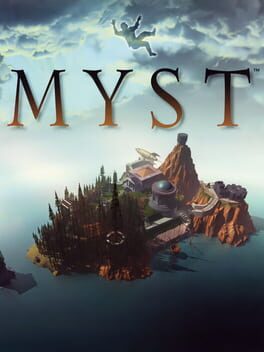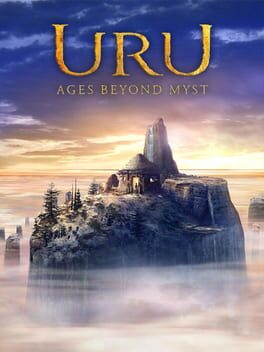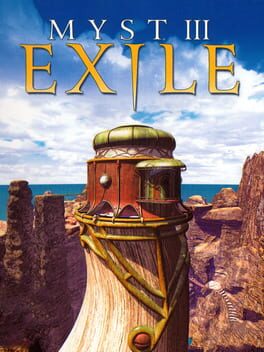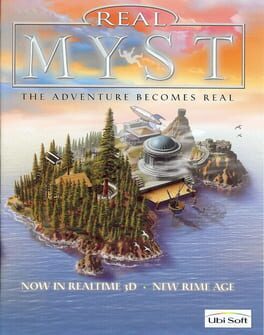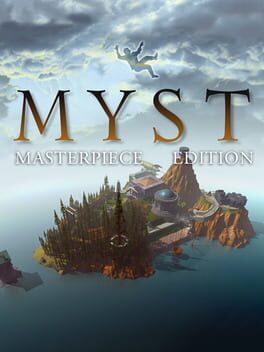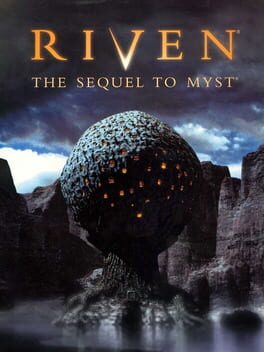

A mystical journey through worlds that changed the concept of an adventure game. Lose yourself in fantastic virtual exploration, blurring the line between fantasy and reality, challenging your wits, instincts, and powers of observation like never before. The fantasy beckons... can you resist its call?
Also in series
Released on
Genres
Reviews View More
US Saturn Release #008 - Myst
Played on a real American Sega Saturn with the Fenrir ODE
Myst knows how to truly immerse you quickly and efficiently. Even if you have a hard time getting into the puzzles and the general game loop, I think you'll appreciate how it feels.
On those puzzles though, they really vary in fun factor. Some of them are really easy, some are tricky nut actually fun to do and make you feel smart for accomplishing, and others make you drag out the ol' notebook. That's not necessarily bad but I wasn't exactly expecting it so I wasn't too happy about it.
This is a game you really need to play with the shuttle mouse (or on emulator with your regular PC mouse). Playing with the controller is just kind of slow and annoying for the most part, really draggin stuff out making you not want to go through some puzzles the intended way just due to how much playing with controller tanks it.
So I guess overall, Myst is an ok game for the Saturn, though, I don't really know why you would play this on Saturn and not on PC.
6/10
Played on a real American Sega Saturn with the Fenrir ODE
Myst knows how to truly immerse you quickly and efficiently. Even if you have a hard time getting into the puzzles and the general game loop, I think you'll appreciate how it feels.
On those puzzles though, they really vary in fun factor. Some of them are really easy, some are tricky nut actually fun to do and make you feel smart for accomplishing, and others make you drag out the ol' notebook. That's not necessarily bad but I wasn't exactly expecting it so I wasn't too happy about it.
This is a game you really need to play with the shuttle mouse (or on emulator with your regular PC mouse). Playing with the controller is just kind of slow and annoying for the most part, really draggin stuff out making you not want to go through some puzzles the intended way just due to how much playing with controller tanks it.
So I guess overall, Myst is an ok game for the Saturn, though, I don't really know why you would play this on Saturn and not on PC.
6/10
Myst is an interesting cultural object that might be a little odd to visit for the first time today. My experience with it was quite positive given the intervening time, despite occasional frustrations.
I think the most striking thing about Myst today is the effectiveness of its pacing and world design. While the actual acting performances are over-the-top, the mechanism of gating the worlds behind journals and puzzles develops an excellent sense of mystery and curiosity.
Reading the journals for the various ages to which you can travel instills a sense of familiarity and anticipation to actually traveling to them. Arriving at an age was exciting, because it meant seeing something in person that you'd only read about, but also an encouraging sense of understanding as you recognize details based on what you've read.
There are a few occasions where it's near impossible to see a particular detail that you must interact with, or to find a path you can travel down in order to get where you need to go. I definitely encourage players to seek out clues or solutions online if they're stuck (I certainly had to a few times). Besides a few of these (probably unintentional) cheap shots, the widely available Masterpiece edition is very playable and very engaging for a sufficiently patient modern player.
I think the most striking thing about Myst today is the effectiveness of its pacing and world design. While the actual acting performances are over-the-top, the mechanism of gating the worlds behind journals and puzzles develops an excellent sense of mystery and curiosity.
Reading the journals for the various ages to which you can travel instills a sense of familiarity and anticipation to actually traveling to them. Arriving at an age was exciting, because it meant seeing something in person that you'd only read about, but also an encouraging sense of understanding as you recognize details based on what you've read.
There are a few occasions where it's near impossible to see a particular detail that you must interact with, or to find a path you can travel down in order to get where you need to go. I definitely encourage players to seek out clues or solutions online if they're stuck (I certainly had to a few times). Besides a few of these (probably unintentional) cheap shots, the widely available Masterpiece edition is very playable and very engaging for a sufficiently patient modern player.
absolutely gorgeous early 3D time capsule with a really interesting world. i like myst for its atmosphere and emptiness, which is something i feel the sequels kinda got wrong. myst appeals to me because it just feels like it's me wandering around this weird ass island alone, trying to solve puzzles. interactions with other characters were very sparse, which really helped to build this atmosphere. the later games in the myst series tried adding more characters to talk to, which kind of broke this atmosphere to me, and i didn't really enjoy them as much. that being said, the original myst is absolutely worth your time
I suspect Myst will go overlooked by the vast majority of modern audiences due to an (arguably) lackluster presentation, yet that may just be the ace up its sleeve. When you compare Myst to any other puzzle game, it's sort of mind-blowing how it has pretty much only individual puzzles per area, barring those having to directly interact with the Age gimmick, and yet there's next-to-zero communicative failure on a sensory side regarding what those puzzles do. Even if you're pixel-hunting to discover the mechanisms you need, or just clicking hopelessly to find another screen you missed somewhere, the actual mechanisms at play are immediately quite clear-cut and intriguing in function. They're industrial, you read the cues of how you'd physically interact with those objects and voila, you've done it. The scope of the areas leaves you still scratching your head about the greater purpose of anything you find in spite of this though, and it's this combination that makes Myst both a solid game for those completely unfamiliar with video games, and those who've spent their life on the medium. Almost every technique here is beginner-friendly, but doesn't push away hardcore players, so much so that the only method of movement is extremely intuitive in a way I think almost anyone could immediately grasp, and is hard to formulate solid complaints against at the same time given Myst's goals. It'll lure in newcomers... but it'll also interest anyone deeply familiar with video games as a whole, with its fascinating setting and worldbuilding that don't fall clearly into any genre of fiction, alongside the creative puzzle concepts, which make the process of "fucking around with (effectively) alien contraptions" all the more alluring. If there's any point to take away from all this: designers of the future, and players, should probably go back to Myst to voice how to clearly communicate unique gameplay ideas without overt text being a driving factor, because it's excellent nonetheless.
